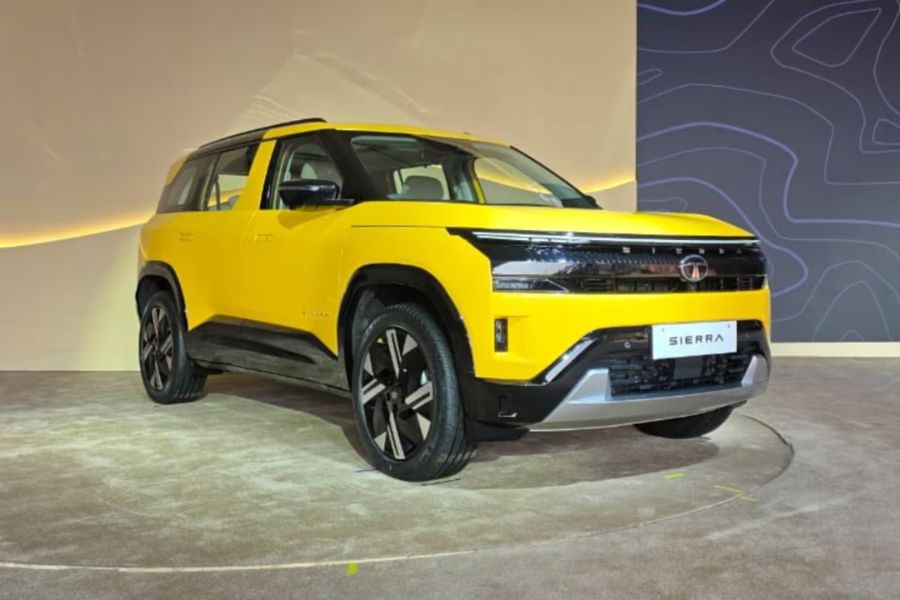Tata Motors is gearing up for a major push in the Indian SUV market with the reborn Tata Sierra, a nameplate that carries both nostalgia and strong brand recall. With SUVs already dominating Tata’s passenger vehicle sales, the company believes the new Sierra will act as a catalyst to propel its SUV market share from the current 16–17 percent to a projected 20–25 percent.
Shailesh Chandra, MD & CEO of Tata Motors Passenger Vehicles, says the Sierra fills a long-standing gap in the company’s SUV portfolio and is well-positioned to elevate Tata Motors into an even stronger competitive position.
Aiming for Strong Volumes in a 40,000–45,000 Unit Segment
The midsize SUV segment—home to bestsellers like the Hyundai Creta and Kia Seltos—records monthly sales of 40,000–45,000 units. Tata expects the Sierra not just to capture a slice of this volume but also to expand the segment further, much like how strong products have transformed other SUV categories.
Chandra asserts that the Sierra’s package will be “the most compelling value proposition” in this space, giving Tata Motors confidence to aim for aggressive volume growth.
Strategic Fit: Sierra Hits the Sweet Spot of SUV Demand
Tata Motors has systematically strengthened its presence in high-demand SUV segments, including subcompact and compact SUVs. The midsize SUV space, being a large revenue pool, was the next natural step for the brand.
Chandra says the Sierra aligns perfectly with where customer demand is headed. Positioned above the Curvv and below the Harrier, it enters a high-volume market at a time when consumer interest in boxy, lifestyle-oriented SUVs is rising.
Will the Sierra Cannibalise the Harrier? Here’s What Tata Says
One potential concern has been whether the Sierra would overlap with the Tata Harrier. Chandra, however, believes the two SUVs will attract distinct customer profiles.
According to him, today’s car buyers don’t shop strictly by segment—they shop by budget and value. This means a buyer looking at midsize SUVs may also consider slightly more expensive high-segment SUVs or premium compact SUVs.
Here’s how Tata sees the distinction:
-
Sierra buyers: More likely to be first-time SUV buyers or customers drawn to boxy, rugged styling and nostalgic value.
-
Harrier buyers: Typically those who prefer a more dynamic, modern SUV silhouette and a different design philosophy.
While some overlap is inevitable, the brand believes both SUVs will comfortably coexist.
Sierra’s Design: Heritage Meets Modern Tech
Reviving an icon like the Sierra came with responsibility. The original Sierra—discontinued around 25 years ago—was ahead of its time and helped define India’s “lifestyle SUV” category.
The new Sierra stays true to the original’s DNA while offering a thoroughly modern experience:
Design Elements Inspired by the OG Sierra
-
Upright, boxy stance
-
Signature wraparound rear glass
-
Clean, purposeful silhouette
Modern Additions for Today’s Buyers
-
A premium, spacious cabin
-
Advanced tech features and connectivity
-
Segment-leading equipment and comforts
Chandra emphasises that the design blends nostalgia with relevance for Gen Y and Gen Z, making the Sierra appealing across a wide buyer base.
Expected to Expand the Midsize SUV Segment
Tata Motors believes that strong products can grow entire segments. The compact SUV space, for example, expanded from 30,000 units to 80,000 units over time due to compelling market entries. The Sierra is expected to have a similar impact on the midsize SUV segment, pulling in buyers who may not have considered this category earlier.
Conclusion
The all-new Tata Sierra is far more than a nostalgic revival—it is a strategic pivot for Tata Motors in the hyper-competitive SUV landscape. With aggressive pricing, distinctive design, and strong brand identity, Tata Motors aims to:
-
Strengthen its presence in the midsize SUV segment
-
Capture a 20–25% share of India’s SUV market
-
Attract buyers across multiple price points
-
Expand the segment with a lifestyle-oriented offering
If the Sierra delivers on its promise, it could become Tata Motors’ next volume driver and one of the most influential SUV launches in recent years.
Read More:

